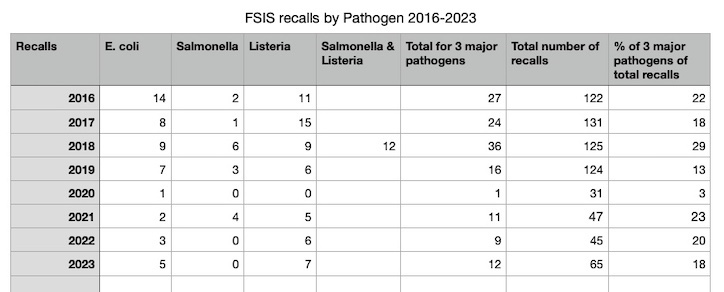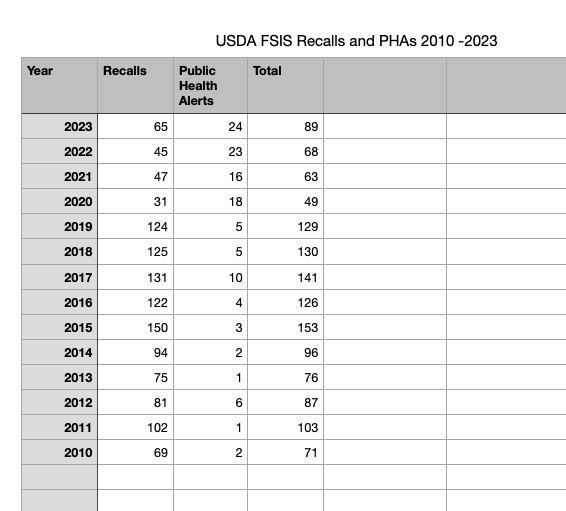In-depth analysis from Food Poisoning Bulletin
Meat and poultry producers issued 65 recalls last year, up 20 from 2022, but still far below the pre-pandemic four-year average of 126, according to a Food Poisoning Bulletin review of meat and poultry recalls published by the U.S. Department of Agriculture’s Food Safety and Inspection Service (USDA FSIS).
Twelve of the recalls were for products contaminated with pathogens, seven with Listeria, and five with E. coli. For the second straight year, there were no meat or poultry recalls for Salmonella, even though the only outbreaks caused by contaminated meat or poultry were two ground beef Salmonella outbreaks.

Two Ground Beef Salmonella Outbreaks
One Salmonella outbreak was linked to ground beef sold at ShopRite stores in four states. Between April 27, 2023, and July 6, 2023, 18 illnesses were reported – Connecticut (1), Massachusetts (1), New Jersey (11), and New York (5). Seven people were so sick they needed to be hospitalized.
Another ground beef Salmonella outbreak sickened 26 people in Northeastern Illinois. The illnesses were reported from Cook, DuPage, Kane, Lake, McHenry, and Will counties between April 26 to May 18, 2023.
In both cases, health officials said a recall wasn’t issued because they were unable to determine the specific source of contamination.

Year 1 of Big 6 Testing
On February 1, 2023, USDA FSIS began testing ground beef, bench trim, and other raw ground beef products for the six most common strains of Shiga toxin-producing E. coli (STEC) known as the Big Six. Shiga toxins are poisonous to humans and cause severe illness.
E. coli O157:H7 is the most common STEC and until February it was the only one routinely tested for. But six other STEC strains, O26, O45, O103, O111, O121, and O145 cause about 80 percent of non-O157 illnesses each year. After years of talking about testing for them, USDA FSIS has finally started.
In 2023, there were four E. coli recalls for boneless or ground beef products. One of them was for E. coli O157:H7, three were E. coli O103.
If a Public Health Alert Falls in the Forest
USDA FSIS issued 24 public health alerts (PHAs) in 2023. The agency uses this method to notify the public about a problem with a meat or poultry product when it has decided not to request a recall from a company. Most often, this happens when the product is no longer for sale.
PHAs, which have the same information as recalls but don’t carry the same weight, have become more common in recent years. Before the pandemic, the 10-year annual average for these notifications was about four, now it’s 20.

There are two main problems with PHAs. The first is that consumers aren’t likely to hear about them. If USDA FSIS issues PHA, companies aren’t required to contact customers, retailers generally don’t post them in stores or on their websites, and the media doesn’t pay much attention to them. The second problem is that they demonstrate that contamination wasn’t detected until long after consumers purchased, and likely eaten, tainted food.
Most of the PHAs issued in 2023 were for misbranding or undeclared allergens. Two of them were for Listeria, which can cause severe illness and death. Among pregnant women, Listeria can cause miscarriage and stillbirth. Symptoms of an infection usually appear within 24 hours of exposure but can sometimes take as long as 70 days to develop.
One of the Listeria PHAs was from a company that used recalled lettuce (an FDA-regulated product) to prepare its salads containing chicken and ham. This PHA was issued one month after the sell-by dates for the salad.
The other was for Kirkland Signature Master Carve Half Ham sold at Costco. The PHA was issued on October 6 for ham that was sold in Northern California and Western Nevada stores from September 26 to September 29.
On September 29, Costco posted a recall notice on its website stating that Sunnyvalley Smoked Meats Inc. was recalling a single code date due to potential Listeria contamination. The products had a “use or freeze by” date of January 2024.
The problem was discovered after laboratory testing by Sunnyvalley indicated that the product may be contaminated with Listeria and should not have entered commerce.

If you have been sickened with a food poisoning infection, please contact our attorneys.
Updated January 4 – This post was updated on January 4, 2024 to include one additional E. coli recall that was posted after the original post was published.




